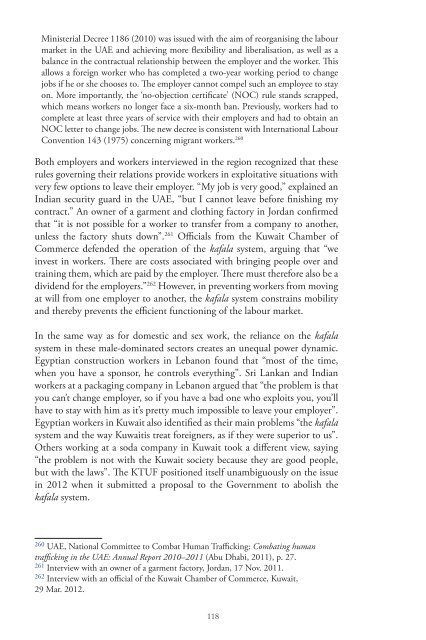Tricked and Trapped: Human Trafficking in the Middle East, ‎pdf 4.1 MB
Tricked and Trapped: Human Trafficking in the Middle East, ‎pdf 4.1 MB
Tricked and Trapped: Human Trafficking in the Middle East, ‎pdf 4.1 MB
You also want an ePaper? Increase the reach of your titles
YUMPU automatically turns print PDFs into web optimized ePapers that Google loves.
M<strong>in</strong>isterial Decree 1186 (2010) was issued with <strong>the</strong> aim of reorganis<strong>in</strong>g <strong>the</strong> labour<br />
market <strong>in</strong> <strong>the</strong> UAE <strong>and</strong> achiev<strong>in</strong>g more flexibility <strong>and</strong> liberalisation, as well as a<br />
balance <strong>in</strong> <strong>the</strong> contractual relationship between <strong>the</strong> employer <strong>and</strong> <strong>the</strong> worker. This<br />
allows a foreign worker who has completed a two-year work<strong>in</strong>g period to change<br />
jobs if he or she chooses to. The employer cannot compel such an employee to stay<br />
on. More importantly, <strong>the</strong> ‘no-objection certificate’ (NOC) rule st<strong>and</strong>s scrapped,<br />
which means workers no longer face a six-month ban. Previously, workers had to<br />
complete at least three years of service with <strong>the</strong>ir employers <strong>and</strong> had to obta<strong>in</strong> an<br />
NOC letter to change jobs. The new decree is consistent with International Labour<br />
Convention 143 (1975) concern<strong>in</strong>g migrant workers. 260<br />
Both employers <strong>and</strong> workers <strong>in</strong>terviewed <strong>in</strong> <strong>the</strong> region recognized that <strong>the</strong>se<br />
rules govern<strong>in</strong>g <strong>the</strong>ir relations provide workers <strong>in</strong> exploitative situations with<br />
very few options to leave <strong>the</strong>ir employer. “My job is very good,” expla<strong>in</strong>ed an<br />
Indian security guard <strong>in</strong> <strong>the</strong> UAE, “but I cannot leave before f<strong>in</strong>ish<strong>in</strong>g my<br />
contract.” An owner of a garment <strong>and</strong> cloth<strong>in</strong>g factory <strong>in</strong> Jordan confirmed<br />
that “it is not possible for a worker to transfer from a company to ano<strong>the</strong>r,<br />
unless <strong>the</strong> factory shuts down”. 261 Officials from <strong>the</strong> Kuwait Chamber of<br />
Commerce defended <strong>the</strong> operation of <strong>the</strong> kafala system, argu<strong>in</strong>g that “we<br />
<strong>in</strong>vest <strong>in</strong> workers. There are costs associated with br<strong>in</strong>g<strong>in</strong>g people over <strong>and</strong><br />
tra<strong>in</strong><strong>in</strong>g <strong>the</strong>m, which are paid by <strong>the</strong> employer. There must <strong>the</strong>refore also be a<br />
dividend for <strong>the</strong> employers.” 262 However, <strong>in</strong> prevent<strong>in</strong>g workers from mov<strong>in</strong>g<br />
at will from one employer to ano<strong>the</strong>r, <strong>the</strong> kafala system constra<strong>in</strong>s mobility<br />
<strong>and</strong> <strong>the</strong>reby prevents <strong>the</strong> efficient function<strong>in</strong>g of <strong>the</strong> labour market.<br />
In <strong>the</strong> same way as for domestic <strong>and</strong> sex work, <strong>the</strong> reliance on <strong>the</strong> kafala<br />
system <strong>in</strong> <strong>the</strong>se male-dom<strong>in</strong>ated sectors creates an unequal power dynamic.<br />
Egyptian construction workers <strong>in</strong> Lebanon found that “most of <strong>the</strong> time,<br />
when you have a sponsor, he controls everyth<strong>in</strong>g”. Sri Lankan <strong>and</strong> Indian<br />
workers at a packag<strong>in</strong>g company <strong>in</strong> Lebanon argued that “<strong>the</strong> problem is that<br />
you can’t change employer, so if you have a bad one who exploits you, you’ll<br />
have to stay with him as it’s pretty much impossible to leave your employer”.<br />
Egyptian workers <strong>in</strong> Kuwait also identified as <strong>the</strong>ir ma<strong>in</strong> problems “<strong>the</strong> kafala<br />
system <strong>and</strong> <strong>the</strong> way Kuwaitis treat foreigners, as if <strong>the</strong>y were superior to us”.<br />
O<strong>the</strong>rs work<strong>in</strong>g at a soda company <strong>in</strong> Kuwait took a different view, say<strong>in</strong>g<br />
“<strong>the</strong> problem is not with <strong>the</strong> Kuwait society because <strong>the</strong>y are good people,<br />
but with <strong>the</strong> laws”. The KTUF positioned itself unambiguously on <strong>the</strong> issue<br />
<strong>in</strong> 2012 when it submitted a proposal to <strong>the</strong> Government to abolish <strong>the</strong><br />
kafala system.<br />
260<br />
UAE, National Committee to Combat <strong>Human</strong> <strong>Traffick<strong>in</strong>g</strong>: Combat<strong>in</strong>g human<br />
traffick<strong>in</strong>g <strong>in</strong> <strong>the</strong> UAE: Annual Report 2010–2011 (Abu Dhabi, 2011), p. 27.<br />
261<br />
Interview with an owner of a garment factory, Jordan, 17 Nov. 2011.<br />
262<br />
Interview with an official of <strong>the</strong> Kuwait Chamber of Commerce, Kuwait,<br />
29 Mar. 2012.<br />
118
















